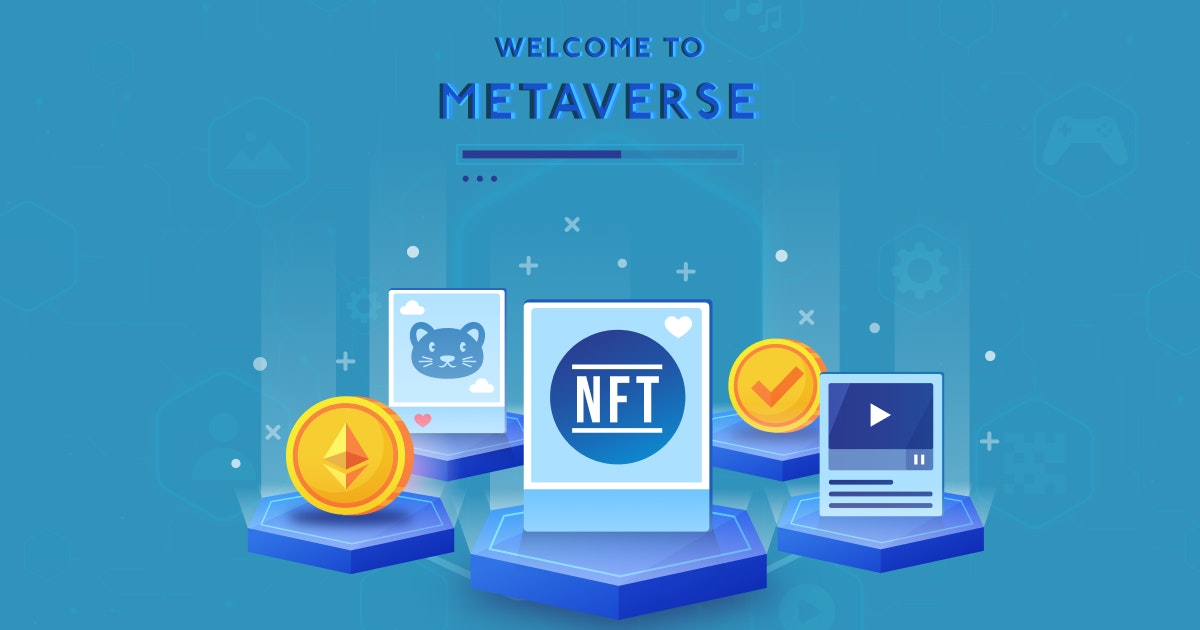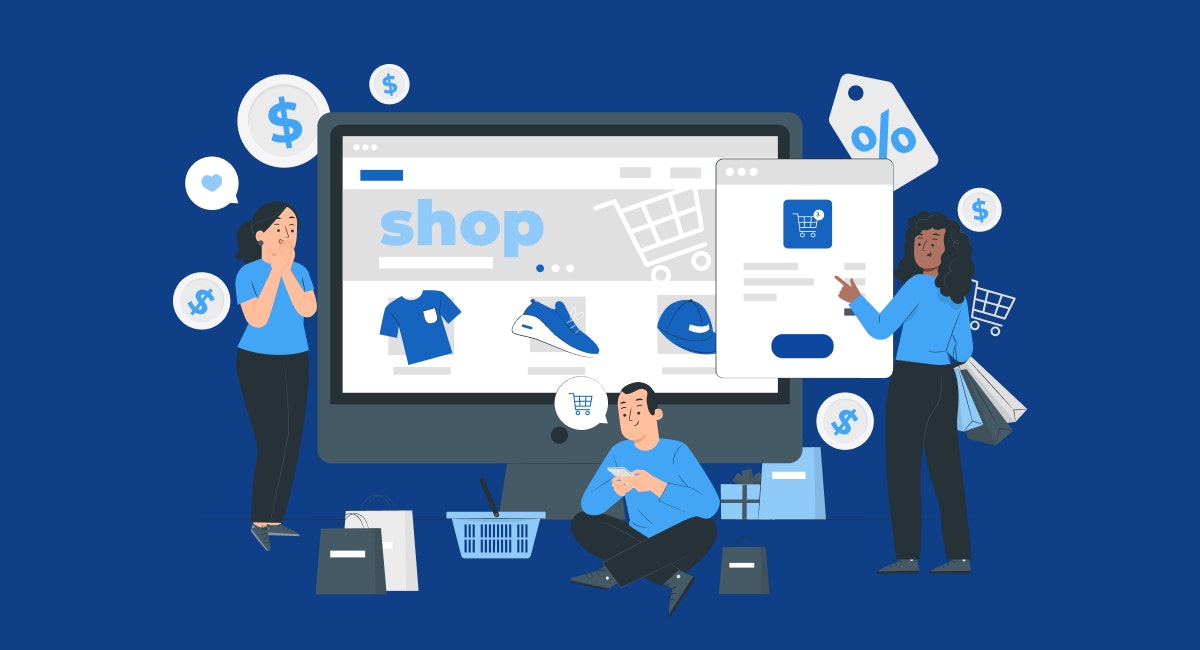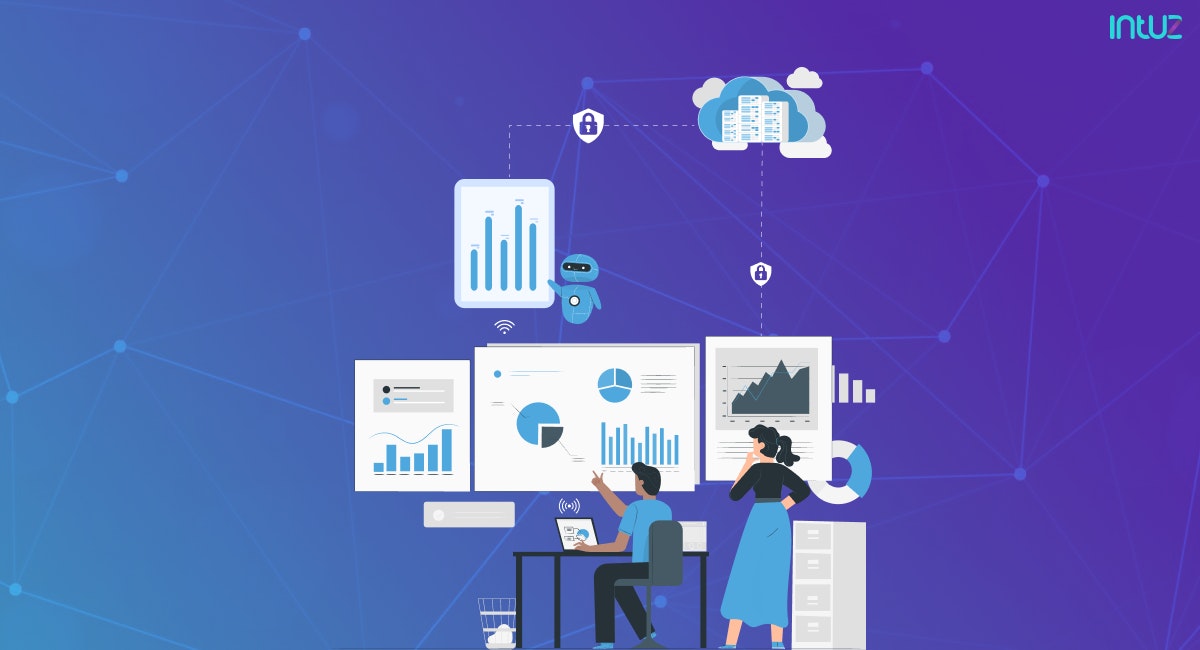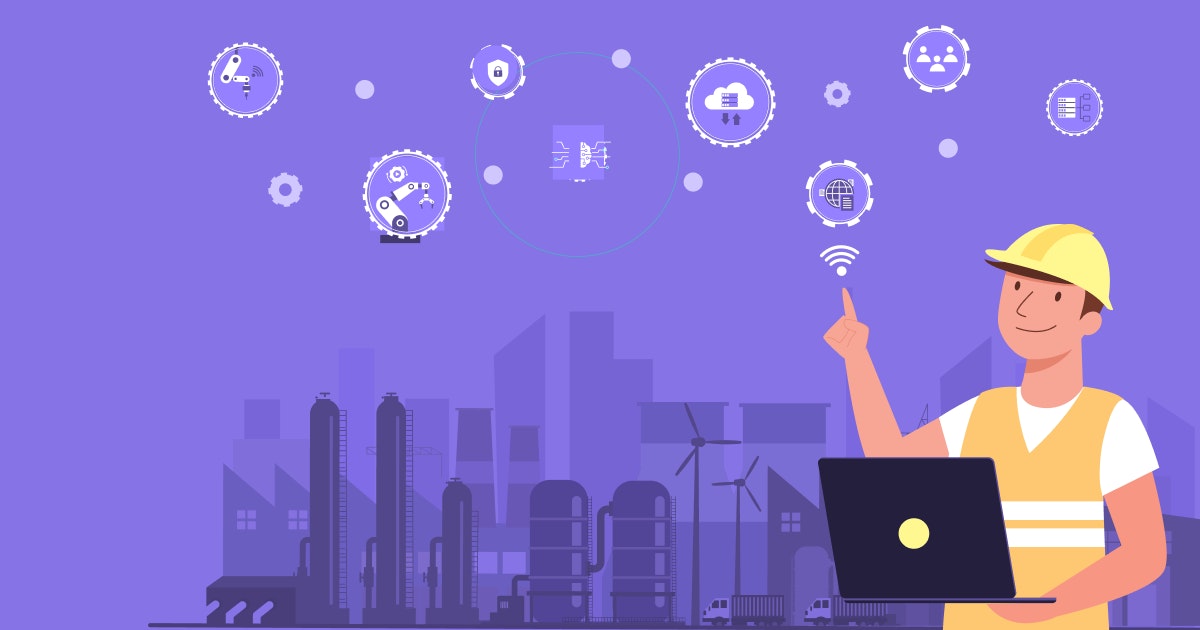Table of Content
As blockchain technology advances, many concepts that previously seemed unreal or were better off as theories are starting to come to life. Today, many blockchain-based platforms utilize cryptocurrencies and non-fungible tokens (NFTs) - creating an environment to build, own, and monetize decentralized digital assets.
In fact, it is possible to have a fully functioning economy inside a virtual world where you can trade in virtual assets! A few lucky people have already managed to 'mint' money by closing deals on digital art or virtual real estate. Who would have thought this was possible a decade ago? Blockchain is genuinely revolutionizing the digital space as we know it!
So, with multiple iterations, the internet brings fantastic opportunities to users. From the advent of static websites to navigating Web2 experiences, the sky's the limit as far as we can see! The Metaverse, obviously, comes next in this chain of advancement.
Wait…what is Metaverse?
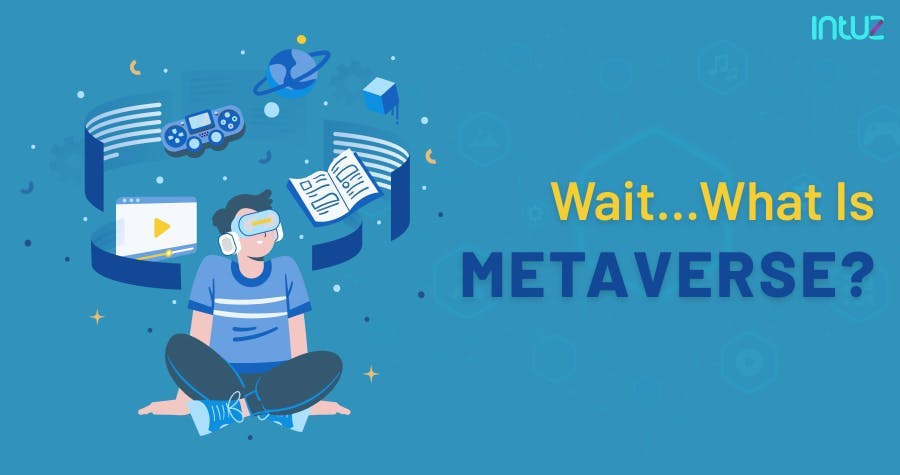
What is Metaverse?
Simply put, a Metaverse is nothing but a network of 3D virtual worlds focused on social connection. In the world of sci-fi, it is often described as a hypothetical iteration of the interweb as a single and universal virtual world made possible by AR and VR headsets.
The idea of a Metaverse is finally becoming more than just an abstract concept. It has grown with recent developments in blockchain technology. The technology can be applied to create virtual worlds within our universe, making it an integral component of the Metaverse.
With its impact on everything around us, Metaverse may soon become a part of our lives, too. The Metaverse represents a highly interactive 3D virtual where exploring the digital realms in personalized avatars is completely ticketless and decentralized.
Like in the real world, one can trade buildings, land, and other digital assets. It is up to the companies to build centralized or decentralized Metaverses. However, the demand for blockchain-powered Metaverse has increased since industries already benefit from blockchain.
Evolution of Metaverse: How it all began
The concept of Metaverse found popularity during the Coronavirus pandemic when people had to go into lockdowns and avoid in-person interaction. This is when businesses implemented remote working policies and adopted digital modes of operating.
Due to the increased reliance on the online realm, people wanted to learn about Metaverse and understand its utility. But there is more than that. Metaverse is a fully immersive form of the internet where we can explore and interact in a digital environment.
The concept dates back to 1838, when famous scientist Sir Charles Wheatstone outlined the term, 'binocular vision.' It combined two images to create a 3D image, and the immersion was created by bringing together a picture for each eye.
The concept evolved into stereoscopes and is used in VR headsets today. Fast forward to 1935, Stanley Weinbaum, an American science fiction writer, published the book Pygmalion's Spectacles. The protagonist of his story explores a fictional world through a pair of goggles.
He experienced sight, sound, taste, smell, and touch in his virtual world. It sounds similar to what we expect to be happening in the Metaverse.
Morton Heilig created the first VR machine in 1956. He merged effects like audio, scents, and a vibrating chair with 3D videos to simulate the experience of riding a motorcycle in Brooklyn. Later in 1960, he patented his design as the first head-mounted display that combined stereoscopic 3D images with stereo sound.
A decade later, the Aspen Movie Map created by MIT offered a computer-generated tour of Aspen, a town in Colorado. So, 1970 was the first time VR was used to transport users to a new virtual space. Neil Stevenson first used Metaverse in 1982 in his book Snow Crash.
The book featured the concept of virtual reality, where his characters would escape from the real world. In 2010, Palmer Luckey created the Oculus Rift VR headset prototype. The 18-year-old inventor and entrepreneur offered a 90-degree field of vision.
The revolutionary headset leverages the computer processing power to provide a unique VR experience. Facebook acquired it in the year 2014 in a $2 billion deal. The company even changed its name to Meta in 2021, implying its interest in the futuristic concept of Metaverse.
Unlock the Potential of NFTs with Intuz - Build Your Own NFT Marketplace Today!
Explore NowUnderstanding the concept of Metaverse with an example
As mentioned previously, after the COVID-19 outbreak, most companies had to shift their operations online following government regulations to curb the spread of the virus. For many, remote working was an opportunity to get out of the office and work at their convenience.
But after two years into the new reality of working-from-home, most employees have shown an interest to re-start going to the office - if not on an everyday basis.
These individuals miss daily interactions with their colleagues and the work environment of their office. The incessant Zoom calls that were earlier an opportunity to catch up with teams soon led to a repulsive phase known as 'Zoom fatigue.'
Imagine a world where you can work in perfect comfort and get all of the information from your office without having to leave your house.
Metaverse is making it possible and bringing in as much reality into it as possible with smart glasses that can virtually augment any room and deliver an interactive experience.
The experience will take a better form with more advanced technologies. For instance, Meta is working on 'haptic gloves' to virtually produce a real-life sensation of touch for users.
Top uses of Metaverse in different sectors
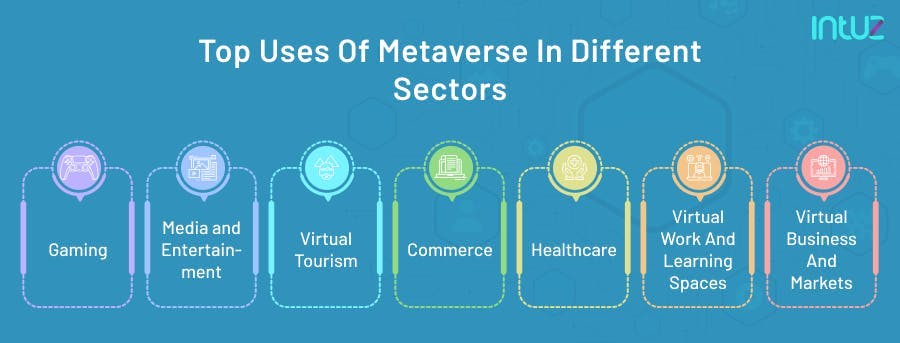
Metaverse in diffrent sectors
Metaverse is an interactive virtual world designed to allow users the opportunity for social interaction. Using the software, cryptocurrency, and advanced human-computer interface hardware like AR/VR headsets, this digital world now provides an environment enabling trade. The prominent Metaverse use cases in different sectors are as follows:
1. Gaming
The introduction of Metaverse in the gaming and electronic sports (esports) domain has taken it to a whole new level. The technology offers the users excellent opportunities to participate in tournaments across the globe and enjoy an immersive experience like never before.
Gamers can interact in realistic environments and win real-world money while socializing and interacting with other players - virtually. Gaming is such an essential component of Metaverse that it is lauded as "a global living room for millions of gamers worldwide."
Is that not fantastic? With the help of blockchain networks, gaming and esports will be accessible to anybody having advanced playing tools. Experts predict that gaming in Metaverse would grow exponentially as the investments in AR and VR surge over time.
2. Media and entertainment
Metaverse allows human interaction in an otherwise stagnant industry. It is responsible for the development and growth of virtual worlds, such as those found in movies like Avatar.
The movie used advanced technologies such as Artificial Intelligence (AI) alongside AR and VR to depict human interaction with aliens through virtual avatars. Released in 2009, the movie was directed by James Cameron, and it became popular internationally due to its uniqueness.
Metaverse is a next-generation virtual world where musicians and artists can perform together on a virtual stage. Fans can join these concerts for an immersive experience like no other.
In April 2012, Tupac Shakur, a famous rapper who was killed in 1996, joined fellow rappers Snoop Dogg and Dr. Dre at the Coachella festival in California. However, this was Tupac, the hologram but lifelike, performing before a shocked and amazed crowd.
3. Virtual tourism
The Metaverse is a revolutionary way to provide personalized customer experiences in the hospitality industry. With 3D virtual tours, customers will be able to explore their preferred hotels before booking an upcoming trip.
The booking and check-in process can be made seamless, and services can be customized to meet customers' needs and demands. Hotels can benefit by optimizing their services and serving their intended audience better.
Once they understand the customer expectations, they can plan accordingly to direct their efforts on meeting those demands.
4. Commerce
More than a decade ago, eCommerce platforms disrupted local and international trade systems, allowing people to buy things online from across the globe. Similarly, the Metaverse will be a world where people can shop from virtual stores and have their purchases delivered at home.
The buying process in this new marketplace is similar to that in the real world. The entire process takes place within an immersive three-dimensional space. There are no trade barriers between countries in the Metaverse, which saves time and cost for the buyers.
5. Healthcare
Through Metaverse, healthcare professionals can now examine patients without traveling long distances. In the virtual world, they have clear insight into the health condition of their patients and interact with them easily. The approach addresses the limitations of both doctors and patients due to physical barriers such as distant geographical locations or a disability.
6. Virtual work and learning spaces
The COVID-19 pandemic has increased the popularity of remote work, online classes, and other arrangements that allow people to be productive from their homes. However, these video conferencing platforms are convenient for real-time audio and video exchanges.
Metaverse interactions include virtual reality for a more immersive experience. The technology offers an engaging experience through its graphically rich virtual environment and 3-D avatars.
Instead of seeing the participants on a computer screen, you can interact with lifelike counterparts in real-time. Think of holograms in Star Wars.
7. Virtual businesses and markets
With the increasing implementation of Metaverse, enterprises are coming out from two-dimensional surfaces and adopting lifelike virtual spaces for an improved customer experience. The technology allows them to promote products and services effectively.
Taking the eCommerce business experience to a new level, the technology allows entrepreneurs to interact with customers and vendors in a virtual environment. You may be able to use this tool for better customer service, inspect products or negotiate prices more effectively.
Metaverse technology has also made space for new business concepts. It allows the tokenization of real-world assets. Digital assets are also being created, which can be traded and owned as cryptos and NFTs.
Benefits of Metaverse
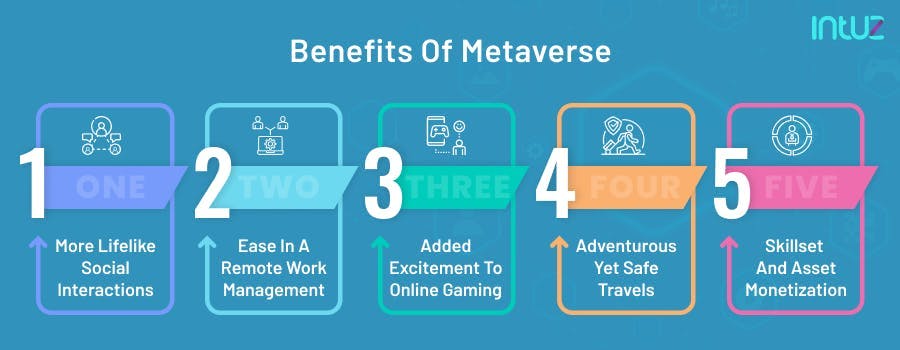
Benefits of Metaverse
Metaverse allows users to interact with other people in virtual reality and share their digital experiences. The technology enables you to have an immersive experience with real-world capabilities. It offers the following benefits:
1. More lifelike social interactions
With Metaverse gaining popularity, human interactions are transforming in a way that no one could imagine two decades ago. First of all, it is not restricted to one-to-one interactions anymore. You can now communicate with people across the globe - in a virtual setting - as you sit in your office or from the convenience of your home.
As the world becomes more connected, businesses and individual relationships are conducted on social media channels. However, these methods can make interaction emotionless, leading to misunderstandings or miscommunication between people in different locations.
Metaverse bridges the gap and enables you to communicate and emote as in the real world. It reduces the impact of physical separation during your interaction.
2. Ease in a remote work management
Metaverse helps address the existing challenges of remote work. Managers can meet employees and communicate with them in the virtual environment created through Metaverse.
The technology allows an in-person interaction enabling the manager to comprehend employee intentions by reading their body language. Employers can set up a virtual office to resolve problems like time theft and goldbricking - thereby improving workplace efficiency.
3. Added excitement to online gaming
The vast and unexplored virtual spaces of the Metaverse games are captivating gamers from all over the globe. These decentralized systems create an integrated economic model that supports play-to-earn gaming. You can buy or sell NFTs created from in-game assets for trading purposes. Exploring the virtual spaces through digital avatars only adds to the fun.
A Complete Guide On NFTs & Marketplaces For Digital Artists
Read now4. Adventurous yet safe travels
Traveling is a great experience, but not everyone can physically and financially afford to travel regularly. Metaverse solves the problem by allowing you to travel to faraway places that are otherwise physically out of your reach.
The advanced virtual world offers first-person views of your selected destination. It deploys AR and VR technologies to offer an adventurous experience.
5. Skillset and asset monetization
The Metaverse is an open-source, decentralized ecosystem that provides opportunities for both enthusiasts and consumers. It provides developers with an ecosystem for different projects.
Development projects are being built to meet business goals. At the same time, everyday people can also join the blockchain-based virtual reality platform as users with unique NFTs can create or trade within the virtual market.
Challenges likely to occur in the Metaverse
Metaverse is an immersive virtual world that brings many opportunities for exploration and adventure but also some significant challenges like:
1. Individual identity protection
Identity theft is a serious issue that affects more and more people every day. Virtual worlds pose particular challenges to those looking for ways of securing their personal information.
There is always a risk of potential bots or hackers trying new techniques to access your information in the digital world. The issue persists in the Metaverse, too, as once stolen, anyone can use an individual's identity. Trouble makers can also fake an individual's identity to harm their reputation.
2. Data security maintenance
Security is a major concern in online environments. Even today, with significant advancements in technology, security threats exist across the global digital landscape. It is complicated to ensure the safety standards needed, especially within virtual worlds like Metaverse.
Maintaining high levels of protection will be essential if we intend to live in an era of Augmented Reality and continue exploring the Metaverse.
3. Payment verifications
As the Metaverse continues to evolve, businesses look forward to enhancing the shopping experience. However, many challenges need to be addressed before it becomes a reality.
The most pressing issue is streamlining transactions and verifying payments consistently across the virtual space. It will require some sort of unique system based on blockchain technology that can assure both security as well as reliability.
It may still be hard to convince businesses and consumers until digital currencies, and payment procedures go mainstream.
Metaverse and blockchain: The relationship
Ask any blockchain development company and they will tell you that without the technology, the concept of Metaverse is incomplete because of the many shortcomings of centralized data storage. As blockchain can function globally, it becomes a single digital source operating on decentralization.
That means it is possible to distinguish the Metaverse from the capacities of the traditional internet, which, of course, takes the form of sites and apps. The blockchain-powered Metaverse enables access to any digital space without a centralized institution.
How do Metaverse and blockchain fit together?
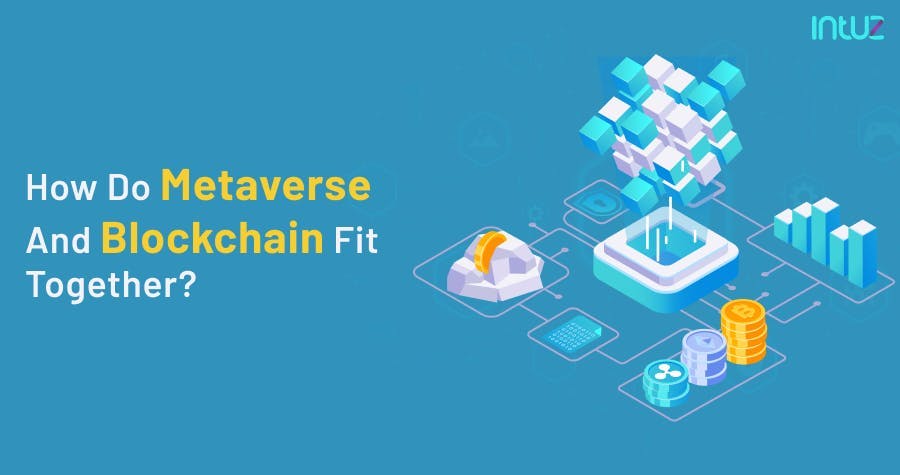
Blockchain in Metaverse
The Metaverse is built on different foundational pillars that have immense potential to shape the perfect digital reality as perceived in its vision. A critical aspect of this foundation is blockchain technology.
It enables the creator economy and provides enterprises with much-needed decentralized infrastructure. Using the blockchain foundation and connectivity technologies, enterprises are creating and interacting within the virtual space via smart contracts.
Whereas the creator economy in the Metaverse utilizes blockchain use cases such as crypto and NFTs for building and transacting assets.
Over to you
Technology is literally ruling the modern times, and technology is changing how we live and function in our lives faster than ever. There is no doubt that the idea of the Metaverse is intriguing, and it has much scope to transform the world and make it smaller and approachable.
If you would like to know more about the concepts of Metaverse, AR/VR, blockchain, NFTs, cryptocurrencies, or IoT development, please do not hesitate to get in touch with our expert team. We will resolve your queries at the earliest.
